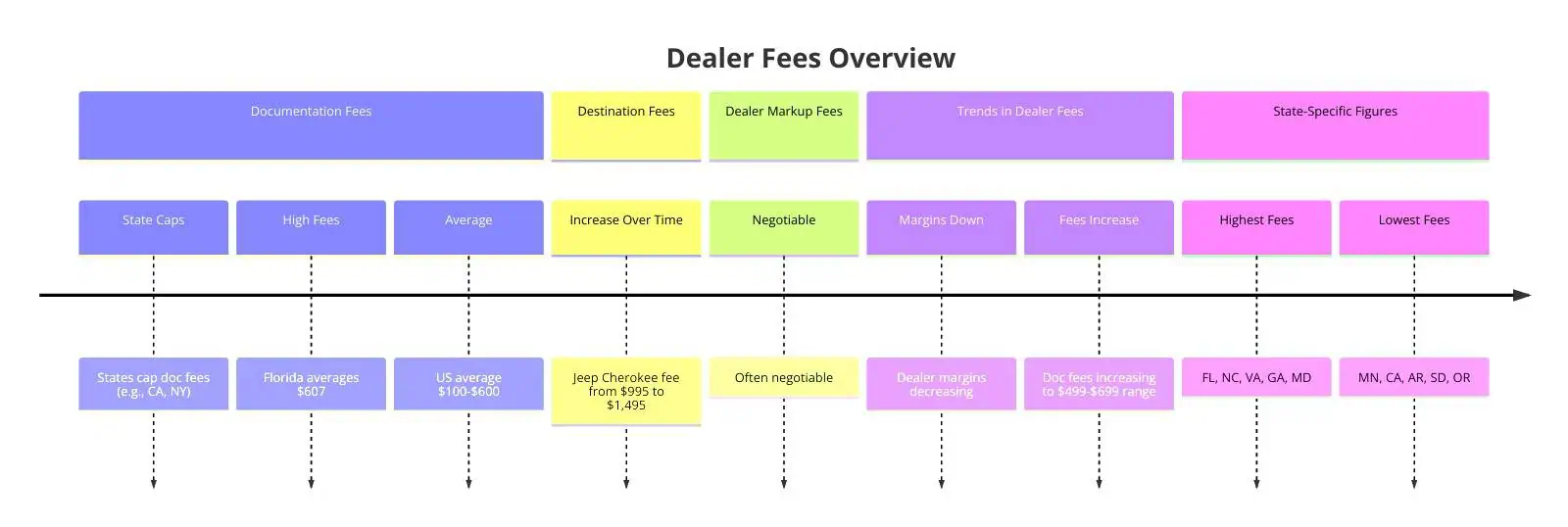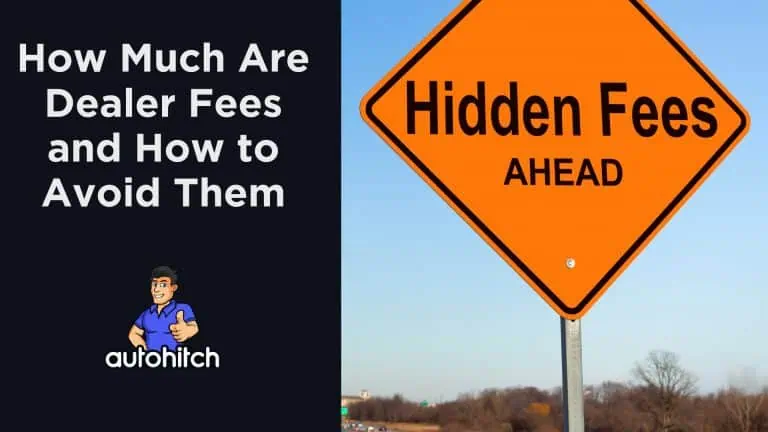If you’re in the market to buy a new or used car from a dealer then it’s time to learn how much dealer fees are, and how to avoid them
Dealer fees can add hundreds or even thousands of dollars to the price you pay for a new or used car. But not all dealer fees are set in stone.
I wrote the article below to help prepare you for the negotiation process so you can identify, negotiate, and potentially eliminate dealer fees.
Relevant Articles To Read:
- Out The Door Price
- How To Negotiate Used Car Price
- Window Sticker By Vin Free – How To
- How Much Do Dealerships Make on New Cars
- How Much Do Dealers Markup Used Cars
- Dealer Fees In Florida
Table of Contents
What Are Dealer Fees?
Dealer fees refer to charges imposed by a car dealership during the buying process, on top of the negotiated vehicle price. Some fees are non-negotiable, while others have room for negotiation.

There are three main categories of dealer fees to understand:
1. Mandatory State Fees
These include sales tax, registration and title fees. They are set by state governments and all buyers must pay them.
2. Dealership Documentation Fees
Charges for processing paperwork and other documentation. Often capped by states and may be negotiable.
3. Discretionary Dealer Add-Ons
Additional fees for things like advertising costs, preparation services and accessories. Typically negotiable if not vital.
Knowing these fee categories helps you pinpoint where negotiations might be possible.
Related Article: What is the VTR Fee?
Dealer Fees by State
I did some research and pulled the average dealer fees for 20 states along with whether that state has a cap in the total dealer fees that are permitted to be charged or not:
| State | Average/Maximum Documentation Fee |
|---|---|
| Florida | $670 |
| Texas | $150 (cap) |
| California | $80 (average), $80 (cap) |
| New York | $175 (maximum) |
| Alabama | $458 (average), no cap |
| Arkansas | $129 (average), no cap |
| Colorado | $508 (average) |
| Georgia | $545 (average) |
| Louisiana | $6,369 (average) |
| Michigan | $4,902 (average) |
| Missouri | $4,877 (average) |
| Kansas | $4,772 (average) |
| Virginia | $749 (average), no cap |
| Wyoming | $500 (average), no cap |
| North Carolina | $599 (average), no cap |
| Minnesota | $75 (average), no cap |
| Washington | $150 (maximum) |
| Wisconsin | $152 (average), no cap |
| West Virginia | $175 (maximum) |
| Pennsylvania | $449 (average), no cap |
6 of the Most Common Dealership Fees
While specific fees vary, data shows the average buyer pays between 8% to 10% of the vehicle price in total dealer fees. Here are six of the most frequent extra charges:
1. Doc Fees
Documentation charges to process DMV paperwork. Average is $382 nationally but over $700 in states like Florida.
Documentation fees, sometimes referred to as doc fees, refer to the handling and processing of paperwork required when purchasing a vehicle. Dealerships spend time preparing sales paperwork and charge buyers for this service.
Doc fees range widely from under $100 to several hundreds of dollars depending on location. Some states cap maximum doc fees – for example, California has a $85 limit.
Overall, you can expect median doc fees to be 1-3% of the total vehicle price. These charges cover administrative costs for title transfers and registration.
2. Destination Fees
For transporting new cars to the dealer lot from manufacturing facilities. Now averages around $1,500 per vehicle.
Destination fees refer to the transportation costs incurred by dealerships to receive inventory from automakers. If you purchase a new car that needs delivery to the lot, expect to pay this vendor-to-dealer freight charge.
Destination fees vary based on vehicle and location, typically $900 to $3,000. You may pay less if buying an in-stock model since overland shipping wasn’t necessary.
Destination charges have increased steadily over recent years alongside vehicle pricing, largely due to increased fuel prices.
3. Advertising Fees
Dealers recouping a portion of advertising expenditure by passing costs to buyers. Can range from $300 to over $1,000.
Many dealers try to offset their advertising budgets by adding advertising fees to buyer invoices. These can either originate from manufacturers themselves or dealers tacking on additional charges above and beyond.
Advertising fees aren’t consistent across retailers and some dealers won’t charge them at all. If suddenly faced with a hefty advertising fee at time of purchase, you have grounds to contest it.
4. Market Adjustment Fees
Price bumps for high-demand vehicles facing limited inventory. There is no regulation on amounts charged by dealers for this fee.
Market adjustment fees are additional markups that dealers apply to in-demand models facing constrained supply. Since these add-ons go straight to dealer profit, some add thousands for popular models.
Market adjustments should always be negotiable since they demonstrate willingness from the buyer to purchase at an elevated price point. Don’t hesitate to push back on egregious market fees that drastically inflate sticker pricing.
5. Dealer Preparation Fees
Charges for cleaning, inspection, and preparation to prepare vehicles for retail sale. Typically $100-$500.
Dealer prep fees cover costs like washing, detailing, mechanical inspections and reconditioning before vehicles are handed off to buyers.
These are intended to cover making cars retail-ready but often already fall under standard destination/transportation charges.
Since dealer prep is duplicative in many cases, buyers can try negotiating the fee amount or declining it if also paying destination costs. Consider the typical $150 dealer prep fee as part of the car price.
6. Add-ons like GAP Insurance
Additional financial products are offered through the dealership during financing. Pricing varies greatly.
Common add-ons pushed by dealer finance teams include Guaranteed Asset Protection (GAP) insurance. GAP covers the difference between vehicle value and remaining auto loan balance if the car is totaled, requiring borrowers to pay off less.
Whether GAP coverage makes sense depends on your down payment amount. With more equity in the vehicle, standard insurance payouts in case of loss close the gap more substantially. Carefully evaluate your situation before accepting GAP policies sold by the dealer, which carry large premium markups. Pricing is very subjective, product-to-product.
4 Tips to Cut Down or Avoid Dealer Fees
You have several options to help minimize the extra fees charged at dealerships:
- Compare documentation fees – Doc fees in particular can have significant variance across dealers. Price shop around within a 50-mile radius to pit dealers against each other. Knowing averages makes negotiations easier.
- Refuse unnecessary add-ons – Be very cautious about accepting things like extended warranties and VIN etching offered by the dealer. These may be cheaper elsewhere or unnecessary.
- Negotiate a lower vehicle price – Counterbalance dealer fees by negotiating the MSRP down. Sacrificing on profit margin gives the dealer incentive to lower other costs.
- Get pre-approved outside financing – If you already have financing, the dealer loses one profit center and may be willing to adjust documentation charges as a result.
The key is leveraging dealership competition because it forces their hand – they would rather cut fees than lose your business.
Expert Tips to Slash Dealer Fees in Half
As a former car dealer, I picked up some insider tips to knock down excessive dealer fees during negotiations:
- Wait to review paperwork until the end – Don’t sign anything related to extra fees and financing until you’ve negotiated the final out-the-door price. It keeps you in control.
- Question each fee – Make them describe what every dealer fee is for and why it’s necessary. This plants seeds of doubt and builds your case.
- Offer to handle certain steps yourself – For example, you can ask to skip VIN etching if you promise to get it done elsewhere later at your own expense.
- Use incentive offers strategically – Things like financing discounts can give you leverage to squeeze on preparation charges since the dealer still wants that kickback from the bank.
- Be ready to walk out – Dealers will call you back if negotiations stall. Be firm if fees don’t align with averages or the vehicle price isn’t right. Patience pays off.
The dealership landscape is extremely competitive. With the right advice and tenacity, reducing your dealer fees substantially is quite achievable.
Answering Common Questions on Dealer Fees
For newer car buyers unfamiliar with the negotiation process, dealer fees seem complex and murky. Here I answer some frequent questions for more clarity:
Are doc fees negotiable? What about advertising fees?
Technically dealership documentation fees are not directly negotiable as they are set costs. However, you can leverage doc fees in negotiations by getting the dealer to discount the purchase price by the amount they are charging in documentation. This at least helps offset the extra cost. Advertising fees are absolutely negotiable in most cases. Just be persistent.
What is a fair doc fee? How much are most dealer fees?
The average documentation fee is $382 nationally. However, state averages range tremendously – from $75 in Minnesota to nearly $1,000 in Florida. Knowing your state baseline is key. Overall, plan for total dealer fees to be 8-10% of your vehicle price, skewing higher on cheaper cars.
Can I just avoid going to dealerships? What about buying online?
Online auto retailers like Carvava and Vroom certainly simplify buying and can reduce fees, but you typically still must handle registration yourself through a local DMV. ultimately for most buyers. Blending online and in-personshopping is ideal – research online then finalize with the dealer willing to knock down the vehicle price if you pay their documentation fees.
What dealer fees are required when buying a used car? How do they compare?
For used vehicles, the required fees are sharply lower, with no destination charges. But you still must pay basic documentation, licensing, title transfer, and sales tax obligations. Average buyer fees on a used car run 5-7%. Shop away from branded dealerships for lower costs when buying pre-owned.
Key Takeaways on Reducing Dealer Fees
Minimizing dealer fees requires research, tactical negotiating, and commitment on the buyer’s end to secure the best out-the-door pricing:
- Dealer fees on new vehicles now frequently exceed 10% of the purchase price, making awareness of the extra charges crucial.
- State regulations dictate baseline costs for documentation and registration fees based on location.
- Add-ons like extended warranties and paint protection are typically inflated by dealers to drive profits. Avoid what you can.
- Multi-dealer price shopping should pressure retailers to adjust documentation charges to earn your business.
- Financing pre-approvals and negotiated vehicle prices offset inevitable fees like title transfers.
Staying informed and flexible gives you the upper hand in interactions with dealership finance offices. Don’t be afraid to push back on excessive or unclear dealer fees before you sign on to any deal.
Sources For This Article
- https://auto.howstuffworks.com/buying-selling/10-fees-you-should-never-pay-when-buying-a-car.htm
- https://www.leaseguide.com/articles/disturbing-new-car-cost-trends/
- https://www.cnn.com/2021/02/26/success/car-buying-destination-fees-feseries/index.html
- https://www.reddit.com/r/lifehacks/comments/17w3nx3/lpt_car_buying_strategy_for_a_better_deal/?rdt=36046
- https://www.insidecarguys.com/how-to-negotiate-when-buying-a-new-car/
- https://www.consumerreports.org/cars/buying-a-car/the-truth-about-destination-fees-a1615480982/



